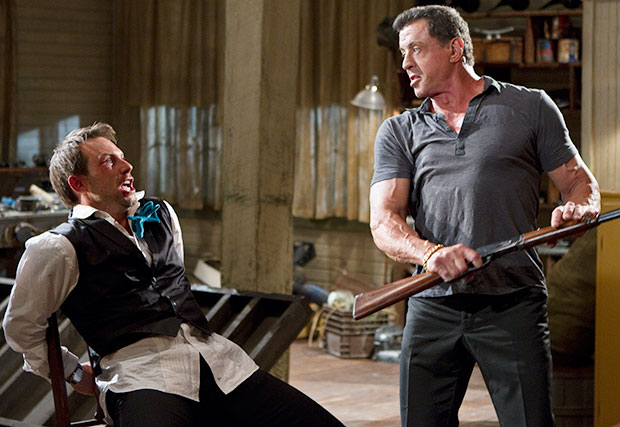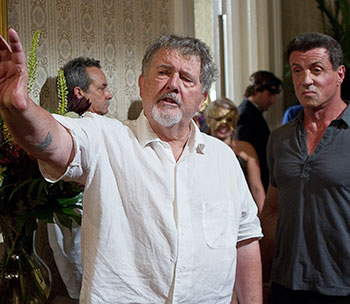
Even with a handful of highly regarded movies under his belt, Walter Hill admits that returning to the director’s seat for Bullet to the Head was no easy task. Hill has a gruff, no B.S. attitude when he discusses his career and Bullet, a film that finally unites him with Sylvester Stallone after years of failed attempts. There’s also excitement in his voice — after all, it’s been ten years since the director of The Warriors and 48 Hrs has been behind the camera for a feature film. Anyone with their own creative endeavors can imagine that that’s a painfully long time.
Hollywood.com spoke to Hill on the set of Bullet to the Head about everything past, present, and future. As a legend of the industry, Hill is a wealth of knowledge — and thankfully, he’s not afraid to speak his mind:
You shot Hard Times here, you shot Southern Comfort out on the bayou. What’s it like being back?
Walter Hill: And Johnny Handsome with Mickey Rourke! It’s nice to be able to come back.
How has it changed?
Walter Hill: They’ve gone through terrible things and rebuilding. It’s always been this interesting place, very different than any other American city. My social commentary on the changes within the city are best left to others. I’m happy to feel that the city is doing so well and it has made, and continues to make, a terrific comeback from the tragedy that happened.
How much does the character of the city bleed into the movie?
Hill: You try to use it. These things are narrative, they’re character, they’re thematic, but they’re also atmosphere. You can use that to your advantage when you get a chance. One of the things I like about New Orleans is it feels like you’re in a Western with the architecture. All the balconies, the old buildings, it feels like you’re in the 1880s. Some of it spills into the movie.
You incorporate a lot of music into your movies. Will you be doing that with this one?
Walter Hill: We’re trying. I’ve got some Cajun music, some old time street bands, that kind of business.
Talk about directing Sly, who’s directed himself so much. This is one of the first times in a while where he’s had a director that has not been himself, so can you talk about working with him?
Hill: I’d kinda surrendered. I’ve been trying to get him to do a movie for about 30 years and never could make it work out. He and I bumped into each other over the years, we had several meetings trying to work things out. And he and I both have the same lawyer so would see each other at various social events. He’s directed about 10 movies, but anybody who’s been a great star as long as he has is gonna be very knowledgEable about the picture business. But I only know one way to direct. He’s … a writer, producer, director, but setting all that aside he’s two things: he’s a very good actor and he’s a star. Both those are very considerable. I think everybody understands about him being a star, but I don’t think people totally appreciate how good an actor he is. Actors often get judged by material as well as their abilities, and I think he’s giving a very good performance in this film. This one’s a little more character-driven than some of his other dramas, but that’s for you to judge, really.
What about the material excites you and made you step up and tackle it?
Hill: I think the biggest thing that drew me in was probably unemployment. I had just had a movie fall apart about six weeks before that I’d been trying to do for a year. It was sent to me. It wasn’t the only thing that was sent to me, but it was the kind of story I thought I knew something about and thought maybe I could make a contribution to. Don’t do things you can’t do something with. I see wonderful movies where I’d be the first to say I couldn’t have done it. I see other movies where I think, “They should have sent that one to me!”
Your actors have mentioned that you have a directing expression: “too much prosciutto.” Was does that mean exactly?
Hill: Sometimes when people have anxiety in their desire to please you and do good, they have a tendency to overdo it. That’s one of our jobs: to pull it back into the range that you think is appropriate to the film. [Sarah Shahi] likes to act her heart out. She’s a strong actress, she pairs very well, she brings a lot to it. Sometimes the very best acting is just people talking to each other. It’s the old joke about don’t get caught acting; if you get caught acting you’re not acting very well.
 Bullet to the Head is obviously rated R based on the violence and the language. How are you taking advantage of the R rating in this film? Some of Sly’s recent films have been really gory, some of them have been less so.
Bullet to the Head is obviously rated R based on the violence and the language. How are you taking advantage of the R rating in this film? Some of Sly’s recent films have been really gory, some of them have been less so.
Hill: I don’t know, I think the answer to that really lies with the people that make the ratings. It’s a very subjective process. I got threatened with an X on a movie that I didn’t think was as tough as some of the other films I’ve done, this was years ago. I just think the process is very subjective. I don’t think there’s any question this is an R movie, and I don’t think there’s anything in it to a degree that’s going to threaten it beyond an R.
You mentioned that this movie clicked for you because it felt like a movie that you could make. Action movies have evolved over time. How is your approach different or in line with today’s blockbusters?
Hill: This is not a big spectacle movie. I think action movies on the whole have moved more and more into large spectacle, even leaving out superhero movies that seem to me to be more a fantastic science fiction than they are action movies. Action movies to me are dramas with recognizable human beings that are in extraordinary situations. Now there’s a lot of elasticism within that definition. They are certainly not very realistic, and they never were — the Steve McQueen movies, or Burt Lancaster, Lee Marvin, whatever you want from the old days. This movie is not a big spectacle movie, and although these kinds of films don’t usually get reviewed this way, or usually approached this way, it’s largely a movie that is presented through the characters. The drama is character driven.
This is what I meant by maybe it’s my kind of thing. There’s a tricky tone, where you try to get some humor into a movie that’s also a tough tale of murder and revenge. You have to ice skate rather carefully between the humor and the action tension part of the drama.
You can’t have “too much prosciutto.”
Hill: No, that’s a different issue, that’s OTT. Prosciutto is over the top. That’s a different issue. It’s trying to find the tone. In that sense, I don’t know if it qualifies as a retro movie, but I think it harkens back. I think it’s very much a modern film.
Does it have a similar feeling to 48 Hrs, that kind of thing?
Hill: Well, it’s more like that than it is Brewster’s Millions.
Do you consider yourself to be a throwback director?
Hill: I consider myself to still be here. I’m still doing my best. I don’t know, I read in the paper that I’m an action director. They always say that, “Action director Walter Hill”, if they bother writing about me at all. I think that’s fine. I’m happy to do the work. The race is already run by now, and I’m lucky enough that I’m here, I’m working, and I’m having a pretty good time doing it.
What are the one or two films off your resume that people always want to talk to you about and that you enjoy talking about?
Hill: Conversations about films are always funny. I would say a majority of people want to talk about what were the more obvious successes, the big box office films. Other people, wanting to be more sensitive to you, want to talk about the ones that maybe didn’t make a lot of money, but they think you might have a special feeling about. And then other people sometimes want to help you by suggesting that you should have done this or that in the movie. That that would have helped you a great deal in whatever capacity. So I just kind of roll with the punches, I guess. I’m always happy to talk to somebody; it’s flattering that people remember your movies. Especially some movie that you did, for Christ’s sake, almost 35 years ago, or what’s especially pleasant is if you’re talking about some movie that you did 35 years ago and they’re 20 years old. That means that they had to find the movie somehow.
There are always remakes being done in Hollywood. There has been talk about remaking Brewster’s Millions, and you have some classic films on your resume. Warriors is always on the verge of a remake.
Hill: They announce it every six months.
Exactly. What are your thoughts on the remake thing?
Hill: My thoughts are very simple: good luck. I had mine and if they want to remake something that usually means you did something right when you did it. I don’t get too excited. I probably seem slightly affected in my answer, but I really don’t. When people say like, “They’re taking this from you,” or something. First of all, I don’t think it’s ever ours, it’s out there. What’s the old Oscar Wilde… “The sincerest form of flattery is imitation.” I mean, the big thing is, don’t look back. You’re a director and you’re doing this one, and hopefully you’re going to do another one. What happened a long time ago, or what somebody is trying to make out of it, that’s fine. But that shouldn’t be the consuming thing in your own life.
[Photo Credit: Warner Bros. Pictures (2)]
Follow Matt Patches on Twitter @misterpatches
More:
Between Takes, ‘Bullet to the Head’ Cast Gushes Over Stallone
Watch the Trailer for Bullet to the Head




